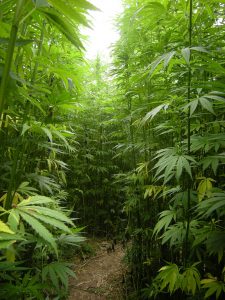By Ross Parker
ticklethewire.com
Overlooked in the firestorm reaction to DEA’s decisions last week declining to re-schedule marijuana was its decision not to alter the enforcement policy on industrial hemp cultivation and sale. To me this was a lost opportunity to bring some rationality and sense to one small part of the Cannabis quagmire which has resulted in the anomalous situation in which half the country has legalized pot for one purpose or another with the federal government continuing to consider it a Schedule I illegal substance.
I thought that the Acting Administrator’s and the agency’s decision on marijuana was a reasonable response. People think that keeping it in the highest schedule is an inflexible insistence that it belongs among the most dangerous drugs. It is not. It merely follows the Controlled Substance Act’s definition that it has not been scientifically proven that it has a currently accepted medical use and poses an acceptable risk. The fact that 25 state legislatures have authorized its medical use is not sufficiently reassuring to me to ignore the recent preliminary studies that it can be a risk to health, particularly for the growing brains of adolescents and young adults.
DEA has authorized 354 individuals and institutions to conduct research on this question, and when that research produces some answers then the decision to re-schedule it can proceed. Meanwhile, federal law enforcement and prosecutors have been forced to walk the tightrope on enforcement particularly in states where its use is otherwise legal.
But I thought DEA whiffed it on the hemp decision. For those unfamiliar with hemp, it is a variety of Cannabis Sativa L and so, even though it has miniscule amounts of the psychoactive THC (below .3%), it was swept up by the Controlled Substances Act of 1970. Thus came the end of a long history of promising and profitable commercial and agricultural uses.
Versatile Hemp
Hemp was used in the Neolithic Age in China to make paper more than 10,000 years ago. Its hardy nature and versatility spread its cultivation until it became one of the most produced agricultural plants in the world. Its uses ranged widely from ropes on ships, clothing, food, and dozens of other products. It is claimed that Columbus’s ships’ riggings, the Gutenberg Bible, the paper on which the Declaration of Independence was written, and the first American flag were all made of hemp products. George Washington and Thomas Jefferson were hemp farmers.
During World War II hemp was used to make uniforms and for other military products. The government considered it so important to the war effort that it produced a film entitled “Hemp for Victory” in 1942. Some irony there.
Today, 30 countries in the world still allow industrial hemp cultivation, and some, like France, Great Britain and Canada, report that in the last two decades it has made a resurgence and that today’s hemp economy has increased by several times. Canadian farmers in particular would be unhappy if their southern neighbor lifted its prohibition. Hemp enthusiasts today claim that the product has an unlimited economic future. With climate change assaulting farmers all over the world, crop versatility becomes increasingly important to their futures as well.
Several states from Vermont to California have passed legislation to make hemp production legal, at least with the consent of the federal government. Farmers in Colorado have put in two crops and apparently have found a market for their production. They are gambling that DEA will not enforce federal law by arresting them and seizing their farms for forfeiture. Although that is unlikely with Colorado a bellwether state for legal, recreational pot, the Wisconsin Menominee Indian Tribe found out last fall that enforcement and eradication is still within the scope of potential DEA action. Several bills have been introduced in Congress to legalize hemp production, but all of them have died because of the opposition by DEA and the Obama administration.
In 2014, Congress did pass a very limited measure which authorizes the cultivation of industrial hemp as part of an agriculture pilot program in states where that is legal under state law. The authorization was limited to colleges and state departments of agriculture for academic research only.
Today, farmers face the bizarre situation in which they could face prosecution and forfeiture of their property for raising harmless hemp to use in clothing manufacture but across the road another farmer is growing some of the most psychoactive marijuana ever grown for shipment to the “medical” dispensaries proliferating in half the country for anyone who can wangle a prescription.
DEA agents are confronted with real battles for the soul of this country, battles involving violent traffickers, destroyed neighborhoods, opiate addiction epidemics, and prescription drug abuse. Continuing to rely on a statutory definition long outmoded and irrational only feeds the cynical message from drug legalization forces that their policies do not deserve the respect and support of the nation’s citizenry.






